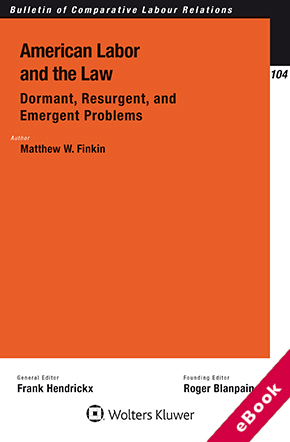
The device(s) you use to access the eBook content must be authorized with an Adobe ID before you download the product otherwise it will fail to register correctly.
For further information see https://www.wildy.com/ebook-formats
Once the order is confirmed an automated e-mail will be sent to you to allow you to download the eBook.
All eBooks are supplied firm sale and cannot be returned. If you believe there is a fault with your eBook then contact us on ebooks@wildy.com and we will help in resolving the issue. This does not affect your statutory rights.
American Labor and the Law presents a detailed analysis of the labor problem in the United States from the struggles of the nineteenth century to the solutions of the twentieth century, and the resurfacing of problems in the twenty-first century. In the United States and worldwide, the “labor question” has recrudesced. Old issues have resurged, sometimes in altered guise. New issues have emerged. Both test the twentieth century’s solutions. This work explores the arc of labor law in the United States from the past-Revolutionary period to the present. It tracks the changes that have reordered business and employment at the century’s turn—the resurgence of old issues in new dress and the emergence of new issues, of which the deployment of technologies—robotization and computerization—has been the catalyst. It closes on the issues labor law is facing in the twenty-first century, including the imponderable of yet a new need to address the definition of citizenship.
What’s in this book:
The author’s thorough coverage of the relevant terrain draws on social and legal history, and also on the current wealth of economic studies across the range of such pressing issues as the following:
How this will help you:
This book provides a necessary background for comparative engagement with economic change enabling readers to obtain an insight into the main changes and challenges in American Labor Law. Because the developments it deals with are global, this is critical reading for policy makers, academics, students, and an enlightened public to put what is happening in broader historical context as seen from the paradigm neoliberal economy and its legal institutions.